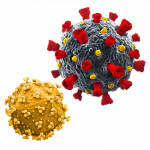People with HIV have a higher rate of Alzheimer’s disease, including the early-onset form, than those without the virus, but antiretroviral (ARV) treatment appears to eliminate this excess risk, according to a new analysis, Healio reports.
Guodong Liu, PhD, an associate professor at Penn State University College of Medicine, presented findings from the study at the Annual Meeting of the American Neurological Association.
Liu and his colleagues analyzed data from the MarketScan national health care claims database of people with private insurance to parse the risk of early onset Alzheimer’s disease among those younger than 65.
The database included 74,144 people with HIV who had been enrolled for at least one year during the study period and who were at least 50 years old at any time therein. Forty-four percent of the cohort members were not prescribed ARVs during the study period.
Among the group of people with HIV as a whole, 0.11% had Alzheimer’s, compared with a rate of 0.07% among those without the virus. A total of 0.16% of those with HIV had early onset Alzheimer’s. However, the Alzheimer’s rate among those receiving HIV treatment was the same as among those without the virus, at 0.07%.
After adjusting the data to account for various differences between the cohort members, including age, sex and the presence of heart disease, hypertension and diabetes, the study authors found that having HIV was associated with a 56% increased risk of early-onset Alzheimer’s. Hower, ARV treatment cut the risk of Alzheimer’s by 50% among people with HIV.
To read the Healio article, click here.







Comments
Comments